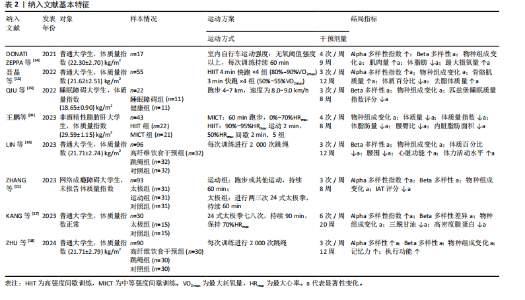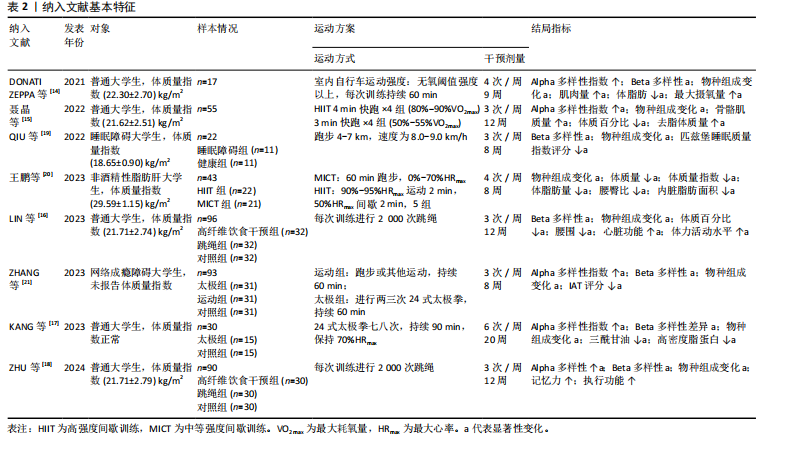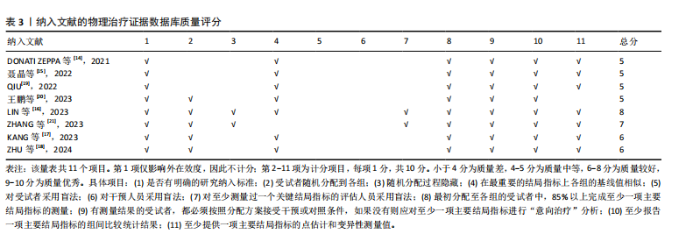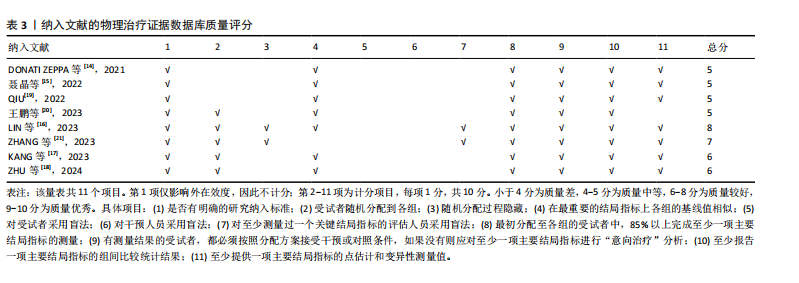Chinese Journal of Tissue Engineering Research ›› 2025, Vol. 29 ›› Issue (11): 2394-2401.doi: 10.12307/2025.354
Previous Articles Next Articles
Effects of exercise intervention on intestinal flora in college students: a systematic review
Liu Zhaozhi1, 2, Huang Li1, 2, Tian Haodong1, 2, Li Lan1, 2, Chen Xiao3, Tao Yunfei1, 2, Peng Li1, 2
- 1School of Physical Education, 2Key Laboratory of Physical Fitness Evaluation and Exercise Performance Monitoring of the General Administration of Sport of China, School of Physical Education, Southwest University, Chongqing 400715, China; 3School of Health, Shandong University of Traditional Chinese Medicine, Jinan 250000, Shandong Province, China
-
Received:2024-03-22Accepted:2024-05-18Online:2025-04-18Published:2024-08-12 -
Contact:Peng Li, PhD, Professor, Doctoral supervisor, School of Physical Education, Southwest University, Chongqing 400715, China; Key Laboratory of Physical Fitness Evaluation and Exercise Performance Monitoring of the General Administration of Sport of China, School of Physical Education, Southwest University, Chongqing 400715, China -
About author:Liu Zhaozhi, Master candidate, School of Physical Education, Southwest University, Chongqing 400715, China; Key Laboratory of Physical Fitness Evaluation and Exercise Performance Monitoring of the General Administration of Sport of China, School of Physical Education, Southwest University, Chongqing 400715, China -
Supported by:National Social Science Foundation of China, No. 21BTY092 (to PL); General Project of Chongqing Administration of Sport, No. B202206 (to HL)
CLC Number:
Cite this article
Liu Zhaozhi, Huang Li, Tian Haodong, Li Lan, Chen Xiao, Tao Yunfei, Peng Li . Effects of exercise intervention on intestinal flora in college students: a systematic review[J]. Chinese Journal of Tissue Engineering Research, 2025, 29(11): 2394-2401.
share this article
Add to citation manager EndNote|Reference Manager|ProCite|BibTeX|RefWorks
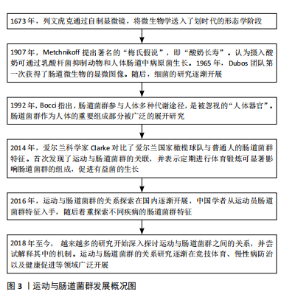
2.1 纳入文献基本特征 此文最终纳入8项研究,共包括446名研究对象,其中5项研究为健康大学生[14-18];另外3项研究分别为轻度网瘾大学生、非酒精性脂肪肝大学生和睡眠障碍大学生[19-21]。6项研究的受试者的体质量指数为正常,1项研究的受试者体质量指数达到超重[20],1项研究未报告受试者体质量指数[21]。3项研究采用了高强度间歇训练[14-15,20];3项研究采用有氧运动干预[16,18-19];2项研究采用太极拳运动[17,21],干预频次为每周3-6次,干预周期为8-20周。纳入研究的肠道菌群检测大部分采用16S rRNA扩增子序列技术,选取V3-V4区进行扩增,仅王鹏等[20]通过特定物种培养皿检测特定物种的丰度变化。所有研究均为实验性研究,发表时间集中在2021-2024年。文献的基本特征见表2。 2.2 文献质量 采用PEDro质量评分量表对所纳入文献进行质量评估,评分结果见表3。共有8篇文献质量合格被纳入(≥4分),其中4篇文章为“质量中等”,4篇文章为“质量较好”。因此该研究所纳入文献的整体质量较高。 2.3 运动与肠道菌群的研究现状 当前,运动因具备良好的健康效益,已成为达成疾病防治、健康促进等目标的重要手段。随着研究深入和技术进步,微生物领域与宿主健康之间的密切联系得到广泛关注,肠道菌群为进一步解释运动如何影响机体健康提供了新的视角。运动与肠道菌群相结合处于起步阶段,此次研究总结了运动与肠道菌群的研究发展时间线,见图3。 "
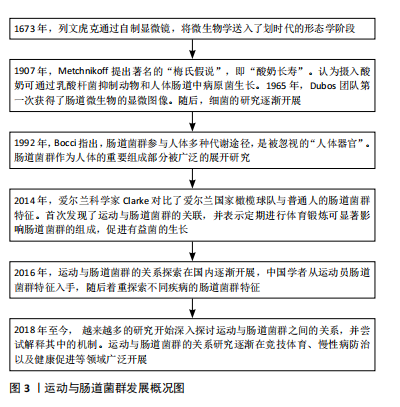
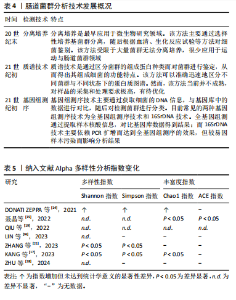
2.4 运动对大学生肠道菌群Alpha多样性的影响 肠道菌群物种Alpha多样性分析包括丰富度和多样性两个维度,Chao1指数和ACE指数为常用丰富度指数,Shannon指数和Simpson指数为常用多样性指数。在纳入8项研究中,有7项研究进行了Alpha多样性分析[14-19,21],这些研究的结局指标涉及Shannon指数、Simpson指数、Chao1指数、ACE指数。表5结果显示,大学生的肠道菌群在4项研究中显著提高(P < 0.05)[15,17-18,21],在DONATI ZEPPA等[14]的研究表示干预后受试者肠道菌群Alpha多样性指数均提高,3项研究仅在研究中表示Alpha多样性未发生显著变化[16,18-19],没有报告多样性变化趋势。不同运动方式存在效果差异,采用高强度间歇训练和太极拳运动的研究均提高了大学生肠道菌群Alpha多样性[14-15,17,21],然而,有氧运动并显著未提升大学生肠道菌群Alpha多样性[18-19,22]。 2.5 运动对大学生肠道菌群Beta多样性的影响 肠道菌群Beta多样性分析用于比较不同组之间或受试者干预前后的微生物群落的异同,6项研究报告了运动干预后肠道菌群Beta多样性变化[14,16-19,21]。纳入研究中大部分采用基于Bray Curtis距离的主坐标分析(PCoA)坐标和OTU水平的PERMANOVA分析来检测Beta多样性,2项研究分别采用加权和未加权的UniFrac距离算法[17,19],并采用PCoA组间微生物群落差异,还有1项研究采用非度量多维尺度Wilcoxon检验评估组间差异[21]。5项研究均表明运动后Beta多样性差异显著(P < 0.05)[14,16-18,21];1项研究表明运动后Beta多样性未显著改变[19],3种运动方式之间不存在效果差异。 2.6 运动对大学生肠道菌群物种组成的影响 此次研究纳入的8项研究均报告了运动对大学生肠道菌群物种组成"
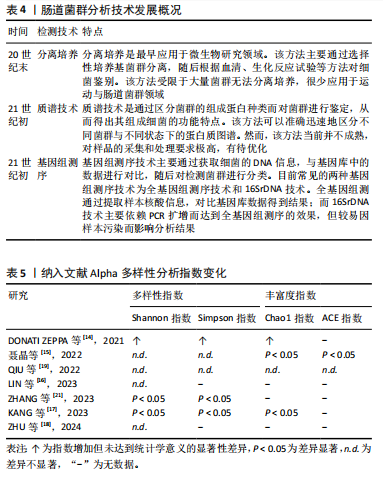
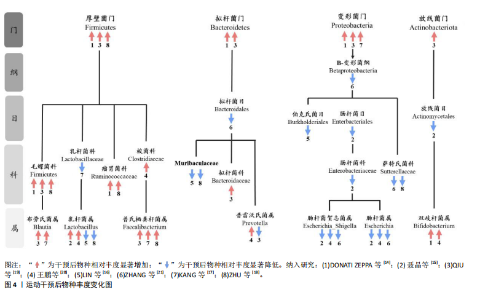
的影响。图4结果显示,大学生肠道菌群主要由厚壁菌门(Firmicutes)、放线菌门(Actinobacteriota)、拟杆菌门(Bacteroidetes)和变形菌门(Proteobacteria)组成,其中厚壁菌门占比最高。在菌门水平上,3项研究结果显示运动增加了厚壁菌门的相对丰度(P < 0.05)[14,18-19];3项研究表示运动降低了变形菌门的相对丰度(P < 0.05)[14,17,19];2项研究表示拟杆菌门在干预后丰度降低(P < 0.05)[14,19],这些结果在菌门分类水平具有一致性,在菌科和菌属水平发现了运动方式上的差异。结果显示,所有运动方式均能提升毛螺菌科(Lachnospiraceae)和瘤胃球菌科(Ruminococcaceae)的相对丰度[14-15,17,19],并降低埃希氏菌志贺菌(Escherichia_Shigella)的相对丰度[15,20-21];高强度间歇训练可以提高大学生肠道中乳酸杆菌(Lactobacillus)[15,20]、双歧杆菌(Bifidobacterium)的相对丰度[14,20],并降低普雷沃氏菌(Prevotella)的丰度[14];有氧运动和太极拳干预后受试者肠道中的菌群丰度变化较为一致,普雷沃氏菌[17]、布劳氏菌属(Blautia)和普氏栖粪杆菌(Faecalibacterium)的丰度在运动后提高[17-19],Muribaculaceae菌属、乳酸杆菌和萨特氏菌(Sutterellaceae)的丰度在运动后降低[16,18]。值得注意的是,相较于高强度间歇训练,有氧运动和太极拳干预后大学生肠道中乳酸杆菌和普雷沃氏菌的丰度出现了与HIIT完全相反的变化。 2.7 运动对大学生其他指标的影响 在纳入的8项研究中,运动也在大学生其他方面产生了良好效益。在4项研究中,运动后受试者体质量、体脂率、体质量指数、腰围、内脏脂肪等体成分指标显著下降[14-16,20];2项研究表明运动后大学生的肌肉量提高[14-15];2项研究表示运动后受试者舒张压和收缩压得到改善[16-17];还有研究表示运动改善了大学生的血脂指标[17]、心肺功能[14]、睡眠障碍[19]、认知功能以及网络依赖[18,21]。"
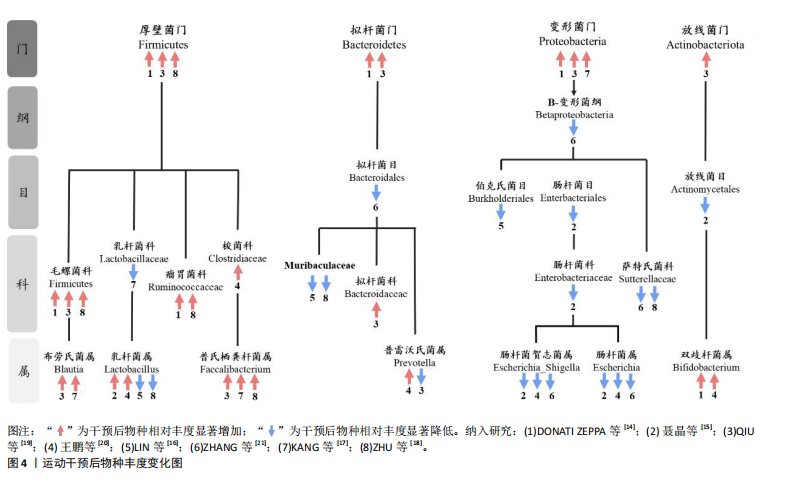
| [1] 张雨韵, 吕亚, 李志成, 等. 基于“肠-皮肤轴”理论及肠道菌群的中药治疗痤疮研究进展[J]. 上海中医药杂志,2024,58(1):96-100. [2] CAMPBELL SC, WISNIEWSKI PJ 2ND. Exercise is a Novel Promoter of Intestinal Health and Microbial Diversity. Exerc Sport Sci Rev. 2017; 45(1):41-47. [3] KÖNIG J, WELLS J, CANI PD, et al. Human Intestinal Barrier Function in Health and Disease. Clin Transl Gastroenterol. 2016;7(10):e196. [4] 赵立平, 张晨虹, 费娜, 等. 以肠道菌群为靶点的代谢病营养干预研究进展[J]. 中国食品学报,2014,14(1):1-5. [5] SHUAI M, FU Y, ZHONG HL, et al. Mapping the human gut mycobiome in middle-aged and elderly adults: multiomics insights and implications for host metabolic health. Gut. 2022;71(9):1812-1820. [6] MILANI C, DURANTI S, BOTTACINI F, et al. The First Microbial Colonizers of the Human Gut: Composition, Activities, and Health Implications of the Infant Gut Microbiota. Microbiol Mol Biol Rev. 2017;81(4): e00036-17. [7] VANDENPLAS Y, CARNIELLI VP, KSIAZYK J, et al. Factors affecting early-life intestinal microbiota development. Nutrition. 2020;78:110812. [8] AYA V, FLÓREZ A, PEREZ L, et al. Association between physical activity and changes in intestinal microbiota composition: A systematic review. PLoS One. 2021;16(2):e0247039. [9] DZIEWIECKA H, BUTTAR HS, KASPERSKA A, et al. Physical activity induced alterations of gut microbiota in humans: a systematic review. BMC Sports Sci Med Rehabil. 2022;14(1):122. [10] YUAN X, CHEN R, ZHANG Y, et al. Gut microbiota: effect of pubertal status. BMC Microbiol. 2020;20(1):334. [11] MOHER D, LIBERATI A, TETZLAFF J, et al. 系统综述和荟萃分析优先报告的条目:PRISMA声明[J].中西医结合学报,2009,7(9):889-896. [12] MOHER D, SHAMSEER L, CLARKE M, et al. Preferred reporting items for systematic review and meta-analysis protocols (PRISMA-P) 2015 statement. Syst Rev. 2015;4(1):1. [14] DONATI ZEPPA S, AMATORI S, SISTI D, et al. Nine weeks of high-intensity indoor cycling training induced changes in the microbiota composition in non-athlete healthy male college students. J Int Soc Sports Nutr. 2021;18(1):74. [15] 聂晶, 刘才响, 周多奇, 等. 以肠道菌群为靶点的HIIT干预效果与NPY基因多态性研究[J]. 北京体育大学学报,2022,45(10):61-74. [16] LIN Z, ZHANG X, WU M, et al. High-fiber diet and rope-skipping benefit cardiometabolic health and modulate gut microbiota in young adults: A randomized controlled trial. Food Res Int. 2023;173(Pt 2):113421. [17] KANG D, WANG X, WANG J. Intervention study of tai chi training on the intestinal flora of college student basketball players. Medicine (Baltimore). 2023;102(36):e35044. [18] ZHU L, MING Y, WU M, et al. Effect of Fiber-Rich Diet and Rope Skipping on Memory, Executive Function, and Gut Microbiota in Young Adults: A Randomized Controlled Trial. Mol Nutr Food Res. 2024;68(3):e2300673. [19] QIU L, GONG F, WU J, et al. Exercise Interventions Improved Sleep Quality through Regulating Intestinal Microbiota Composition. Int J Environ Res Public Health. 2022;19(19):12385. [20] 王鹏, 刘宝亮, 刘岩, 等. 运动结合饮食干预对肥胖非酒精性脂肪肝女大学生身体成分和脂代谢及肠道菌群的影响[J]. 中国学校卫生,2023,44(8):1169-1173. [21] ZHANG X, YANG H, ZHANG K, et al. Effects of exercise or tai chi on Internet addiction in college students and the potential role of gut microbiota: A randomized controlled trial. J Affect Disord. 2023;327: 404-415.
[22] LIU C, FENG X, LI Q, et al. Adiponectin, TNF-α and inflammatory cytokines and risk of type 2 diabetes: A systematic review and meta-analysis. Cytokine. 2016;86:100-109. [23] 谢扬帆, 曹玲敏, 汪雪媛, 等. 中国胰腺癌患者肠道菌群多样性组成谱的系统评价[J]. 中国循证医学杂志,2023,23(2):186-190. [24] BIEDERMANN L, ROGLER G. The intestinal microbiota: its role in health and disease. Eur J Pediatr. 2015;174(2):151-167. [25] OTT SJ, MUSFELDT M, WENDEROTH DF, et al. Reduction in diversity of the colonic mucosa associated bacterial microflora in patients with active inflammatory bowel disease. Gut. 2004;53(5):685-693. [26] MONDA V, VILLANO I, MESSINA A, et al. Exercise Modifies the Gut Microbiota with Positive Health Effects. Oxid Med Cell Longev. 2017; 2017:3831972. [27] LI JX, HONG Y, CHAN KM. Tai chi: physiological characteristics and beneficial effects on health. Br J Sports Med. 2001;35(3):148-156. [28] SIU PM, YU AP, CHIN EC, et al. Effects of Tai Chi or Conventional Exercise on Central Obesity in Middle-Aged and Older Adults : A Three-Group Randomized Controlled Trial. Ann Intern Med. 2021;174(8):1050-1057. [29] RAMOS C, GIBSON GR, WALTON GE, et al. Systematic Review of the Effects of Exercise and Physical Activity on the Gut Microbiome of Older Adults. Nutrients. 2022;14(3):674. [30] 田浩冬, 黄丽, 刘昊为, 等. T2DM患者运动响应与肠道菌群代谢: 关系探究与机制推断[J]. 上海体育学院学报,2023,47(4):24-38. [31] SHORT KR, VITTONE JL, BIGELOW ML, et al. Impact of aerobic exercise training on age-related changes in insulin sensitivity and muscle oxidative capacity. Diabetes. 2003;52(8):1888-1896. [32] FLINT HJ, SCOTT KP, LOUIS P, et al. The role of the gut microbiota in nutrition and health. Nat Rev Gastroenterol Hepatol. 2012;9(10): 577-589. [33] 罗佳, 金锋. 肠道菌群影响宿主行为的研究进展[J]. 科学通报, 2014,59(22):2169-2190. [34] MIN L, ABLITIP A, WANG R, et al. Effects of Exercise on Gut Microbiota of Adults: A Systematic Review and Meta-Analysis. Nutrients. 2024; 16(7):1070. [35] LIU S, CHENG L, LIU Y, et al. Relationship between Dietary Polyphenols and Gut Microbiota: New Clues to Improve Cognitive Disorders, Mood Disorders and Circadian Rhythms. Foods. 2023;12(6):1309. [36] UUSITUPA HM, RASINKANGAS P, LEHTINEN MJ, et al. Bifidobacterium animalis subsp. lactis 420 for Metabolic Health: Review of the Research. Nutrients. 2020;12(4):892. [37] OZATO N, SAITO S, YAMAGUCHI T, et al. Blautia genus associated with visceral fat accumulation in adults 20-76 years of age. NPJ Biofilms Microbiomes. 2019;5(1):28. [38] HOLMBERG SM, FEENEY RH, PRASOODANAN PKV, et al. The gut commensal Blautia maintains colonic mucus function under low-fiber consumption through secretion of short-chain fatty acids. Nat Commun. 2024;15(1):3502. [39] MA Y, WANG W, ZHANG H, et al. Supplemental Bacillus subtilis DSM 32315 manipulates intestinal structure and microbial composition in broiler chickens. Sci Rep. 2018;8(1):15358. [40] HE H, LIN M, YOU L, et al. Gut Microbiota Profile in Adult Patients with Idiopathic Nephrotic Syndrome. Biomed Res Int. 2021;2021:8854969. [41] BUTERA A, DI PAOLA M, PAVARINI L, et al. Nod2 Deficiency in mice is Associated with Microbiota Variation Favouring the Expansion of mucosal CD4+ LAP+ Regulatory Cells. Sci Rep. 2018;8(1):14241. [42] 梁家琪, 刘恒旭, 阳金鑫, 等. 运动与肠道菌健康效益的关系[J]. 中国组织工程研究,2023,27(8):1292-1299. [43] SÁNCHEZ B, DELGADO S, BLANCO-MÍGUEZ A, et al. Probiotics, gut microbiota, and their influence on host health and disease. Mol Nutr Food Res. 2017;61(1). doi: 10.1002/mnfr.201600240. [44] CHEN K, ZHOU F, ZHANG J, et al. Dietary Supplementation with Sea Buckthorn Berry Puree Alters Plasma Metabolomic Profile and Gut Microbiota Composition in Hypercholesterolemia Population. Foods. 2022;11(16):2481. [45] ALLEN JM, MAILING LJ, NIEMIRO GM, et al. Exercise Alters Gut Microbiota Composition and Function in Lean and Obese Humans. Med Sci Sports Exerc. 2018;50(4):747-757. [46] LUKOVAC S, BELZER C, PELLIS L, et al. Differential modulation by Akkermansia muciniphila and Faecalibacterium prausnitzii of host peripheral lipid metabolism and histone acetylation in mouse gut organoids. mBio. 2014;5(4):e01438-14. [47] DALILE B, VAN OUDENHOVE L, VERVLIET B, et al. The role of short-chain fatty acids in microbiota-gut-brain communication. Nat Rev Gastroenterol Hepatol. 2019;16(8):461-478. [48] KOH A, DE VADDER F, KOVATCHEVA-DATCHARY P, et al. From Dietary Fiber to Host Physiology: Short-Chain Fatty Acids as Key Bacterial Metabolites. Cell. 2016;165(6):1332-1345. [49] HONG J, JIA Y, PAN S, et al. Butyrate alleviates high fat diet-induced obesity through activation of adiponectin-mediated pathway and stimulation of mitochondrial function in the skeletal muscle of mice. Oncotarget. 2016;7(35):56071-56082. [50] PAN JH, KIM JH, KIM HM, et al. Acetic acid enhances endurance capacity of exercise-trained mice by increasing skeletal muscle oxidative properties. Biosci Biotechnol Biochem. 2015;79(9):1535-1541. [51] FEI N, ZHAO L. An opportunistic pathogen isolated from the gut of an obese human causes obesity in germfree mice. ISME J. 2013;7(4):880-884. |
| [1] | Zheng Huakun, Yin Mingyue, Liu Qian. Effects of interval and continuous training on the quality of life in physically inactive adults: a meta-analysis [J]. Chinese Journal of Tissue Engineering Research, 2025, 29(8): 1727-1740. |
| [2] | Yu Hanglin, Tian Haodong, Wen Shiyuan, Huang Li, Liu Haowei, Li Hansen, Wang Peisong, Peng Li. Changes in glucose metabolism and intestinal flora in patients with type 2 diabetes mellitus after high-intensity intermittent exercise [J]. Chinese Journal of Tissue Engineering Research, 2025, 29(2): 286-293. |
| [3] | Yin Yue, Leng Siyi, Jin Pan, Chen Ziyang, Pu Rui . Intestinal flora, exercise intervention and respiratory diseases [J]. Chinese Journal of Tissue Engineering Research, 2025, 29(14): 3034-3042. |
| [4] | Guo Xinfeng, Liang Zhidong, Chen Huiyu, Li Yang. Effects of training modalities and training cycles on visceral and subcutaneous fat in recessively obese individuals [J]. Chinese Journal of Tissue Engineering Research, 2025, 29(11): 2340-2346. |
| [5] | Jing Tianyuan, Wang Ping, Wang Yi, Hu Yanan, Liu Shanxin, Sun Guodong, Du Haitao. Luzhongjiangu decoction for the treatment of femoral head necrosis in rats: changes in intestinal flora and serum hormones [J]. Chinese Journal of Tissue Engineering Research, 2024, 28(35): 5598-5605. |
| [6] | Yang Qihang, Pu Rui, Chen Ziyang, Leng Siyi, Song Yongjing, Liu Hui, Du Guangyou. Intestinal flora and osteoporosis and exercise intervention [J]. Chinese Journal of Tissue Engineering Research, 2024, 28(26): 4250-4256. |
| [7] | Yang Qihang, Pu Rui, Chen Ziyang, Leng Siyi, Song Yongjing, Liu Hui, Du Guangyou. Role and mechanism of intestinal flora metabolites in obesity regulation [J]. Chinese Journal of Tissue Engineering Research, 2024, 28(2): 308-314. |
| [8] | Ma Xinran, Liu Xinhao, Li Yujia, Luo Kailiang, Ma Shujie, Hu Jun. Effect of treadmill exercise on the structure and diversity of intestinal microflora in rats with Parkinson’s disease [J]. Chinese Journal of Tissue Engineering Research, 2024, 28(14): 2227-2233. |
| [9] | Liang Jiaqi, Liu Hengxu, Yang Jinxin, Yang Yi, Deng Xuhui, Tan Mingjian, Luo Jiong. Health benefit relationship between exercise and intestinal bacteria [J]. Chinese Journal of Tissue Engineering Research, 2023, 27(8): 1292-1299. |
| [10] | Leng Siyi, Pu Rui, Chen Ziyang, Yang Qihang, Song Yongjing, Liu Hui. Roles of exercise intervention in intestinal flora in autoimmune diseases [J]. Chinese Journal of Tissue Engineering Research, 2023, 27(32): 5219-5226. |
| [11] | Cui Zhenhua, Lin Xiafei, Chen Yongmin, Lin Ye, Li Guanyu, Song Zhenhua. Acupuncture and moxibustion combined with rehabilitation therapy improve neurological function and intestinal flora following cerebral ischemia in rats [J]. Chinese Journal of Tissue Engineering Research, 2023, 27(17): 2692-2698. |
| [12] | Qiao Qiqi, Wu Yixin, Wang Xin, Xia Zhongliang. Effect of high-definition transcranial direct current stimulation on human dynamic balance [J]. Chinese Journal of Tissue Engineering Research, 2022, 26(26): 4192-4198. |
| [13] | Shu Wenbo, Chen Mengchi, Li Hua, Huang Liqian, Huang Binbin, Zhang Wenhai, Wu Yachen, Wang Zefeng, Li Qiaoli, Liu Peng. Correlation between body fat distribution and characteristics of daily physical activity in college students [J]. Chinese Journal of Tissue Engineering Research, 2021, 25(8): 1277-1283. |
| [14] | Ye Erbai, Xiao Xiaoling, He Ziyu, Yang Chun, Du Yikuan. Peroxisome proliferator-activated receptor signaling pathway is involved in the metabolic regulation of obesity by intestinal flora and brown adipose tissue [J]. Chinese Journal of Tissue Engineering Research, 2021, 25(32): 5222-5226. |
| [15] | Pang Bo, Ji Zhongqiu, Jiang Guiping, Zhang Zihua, Li Jiahui. Biomechanical characteristics on ball games for male youth with different body mass index based on AnyBody simulation and electromyogram test [J]. Chinese Journal of Tissue Engineering Research, 2020, 24(3): 383-389. |
| Viewed | ||||||
|
Full text |
|
|||||
|
Abstract |
|
|||||
